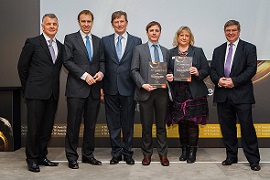Blog

Guest Blog: Smarter Regions - Canterbury Christ Church University collaborates with third sector organisation
21 Mar 2014
 Canterbury Christ Church University partnered with third sector organisation: Kent Children’s Fund Network (KCFN), to support them with developing a financially sustainable training centre and business model to support professional development and training for the children's workforce and further develop play days and activities for families across Kent.
Canterbury Christ Church University partnered with third sector organisation: Kent Children’s Fund Network (KCFN), to support them with developing a financially sustainable training centre and business model to support professional development and training for the children's workforce and further develop play days and activities for families across Kent.
Previously reliant on grants to fund their work, KCFN wanted to set up a training centre for the children’s workforce and build a financially sustainable business model, without reliance on grant funding. Through a Knowledge Transfer Partnership (KTP) with the university, they secured funding for 60% of the two-year project’s cost. As a result, KCFN benefited from a dedicated academic Lynn Morris from the University’s Business School, to lead the project and work collaboratively with their CEO and a university graduate.
The graduate Chris Songhurst worked within KCFN to develop a business plan, identify the market and set up and promote the new learning centre. The company also had access to university experts who advised on managing organisational change, developing training programmes and researching new ideas.
Stephen Bell, KCFN CEO said: "We've been able to make the shift in our business model, resulting in additional opportunities and unexpected benefits. Not only did we exceed our output targets but we also engaged in consortium working to bid for large scale contracts and on-going partnership projects with Canterbury Christ Church University.
KCFN became a preferred provider for training the children’s workforce, won new contracts and partnerships, were rated as excellent in market surveys by 12% more stakeholders and are generating 45% of income from sustainable sources.
The collaboration between Canterbury Christ University and KCFN was the winner of the 2013 National RCUK Societal Impact Award. While this is one of many examples of how universities work in partnership with external organisations, universities are also businesses in their own right and they make a significant contribution to their local economies.
The university supports students and staff who volunteer thousands of hours to help local employers and charities.
Canterbury Christ Church University impacts its regional economy in the following ways:
- South East’s largest provider of courses for public service careers, with thousands of student nurses and teachers going on to work in the South East’s hospitals and schools
- 94% of its most recent UK undergraduates in employment or further study 6 months after completing their studies
- 50% of its graduates staying in Kent and Medway, reinvesting their skills and knowledge into local communities
- 2,012 jobs have been created in the South East as a result of Christ Church students’ spending power and, by choosing to study locally, students from the South East put £109million back into the regional economy
- £450 million impact on the South East economy each year
Audrey Songhurst, Director of Research and Enterprise Development Centre, Canterbury Christ Church University
@CanterburyCCUni
Image: Canterbury Christ Church University receiving the 2013 National RCUK Societal Impact Award